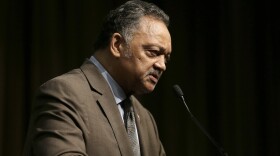The state Senate’s budget includes a plan to give the legislature more power to pick judges.
The Senate gave final approval to its budget bill on Thursday in a 37-12 vote, with seven Democrats voting yes. One provision that’s prompting outcry from Democrats is a provision to add 10 new special Superior Court judges.
Those judges are typically selected by the governor, who’s responsible for filling most judicial vacancies from Supreme Court down to local District Court judges. But the Senate wants the new judges to be appointed by the legislature instead, with eight-year terms.
Most Superior Court judges are elected by the counties they serve, but the state also has additional appointed "special" judges who can fill in or handle complex business cases.
Sen. Mujtaba Mohammed, D-Mecklenburg, says lawmakers are trying to get more control over how judges rule.
"We are forsaking the fundamental principles of an independent judiciary, and shamefully dismantling the checks and balances that safeguard our state government simply for the perseverance of one-party rule," Mohammed said. "This is a departure from what has always worked: The governor appoints and the General Assembly confirms our special Superior Court judges."
Senate leader Phil Berger says it’s an effort to diversify who has the power to pick judges. The budget funds the additional positions because the judicial system needs more judges, and "it was felt that it was time for us to look at addressing some issues as far as spreading out the authority to appoint judges."
Berger added that Republicans aren’t currently looking at taking away the governor’s power to appoint existing judicial positions. But the special Superior Court judges provision isn't the only part of the Senate budget that limits the governor's appointment powers. A separate bill that would eliminate appointments by the governor to local community college boards is also included in the budget bill.
In his floor speech during Wednesday's budget debate, Mohammed also raised concerns with several other proposed changes to the judicial branch.
One of those involves how three-judge panels are selected to review lawsuits challenging redistricting maps or other actions by the General Assembly. Typically, those panels include the senior Superior Court judge for Wake County — where such lawsuits are filed — and two other judges picked by the N.C. Supreme Court's chief justice.
Wake County judges tend to be Democrats, because of the political leanings of the Raleigh area; the chief justice is currently a Republican. The budget provision also eliminates a requirement that the judges on a panel must be from different areas of the state.
"Only the chief justice will have the power to select all three judges with minimal limitations," Mohammed said. "And those appointment options will now include your handpicked special Superior Court judges."








